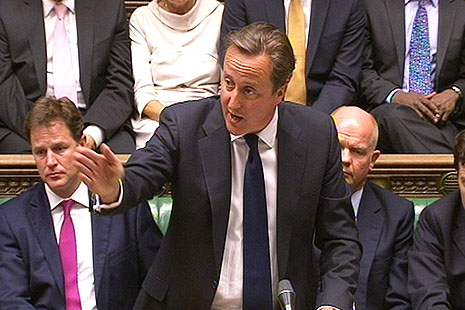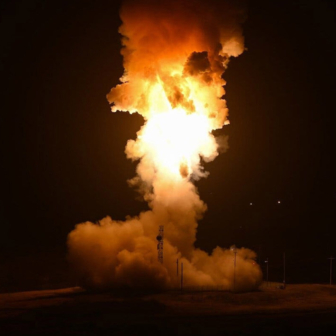HOLD the front page! The classic newspaper battle cry, redolent of tobacco lips, inky fingers, fevered heads and rolling presses, is now but a faint echo of print’s high era. But on two occasions in London in the last week, the late-night irruption of real-world events into the more sterile atmosphere of the modern newsroom has made it resound.
First, on the evening of 29 August, David Cameron’s government lost by thirteen votes a motion allowing it to make preparations to attack Bashar al-Assad’s regime in Syria in retaliation for its presumed use of chemical weapons. Then, two days later, Barack Obama’s announcement that he too would be consulting the legislative branch of government to seek endorsement for any assault – which will take until 9–10 September at least – arrived just as London’s heavyweight Sunday papers were signing off their lead stories.
In each case, the timing heightened the sense of intense drama that surrounds the Syria debate in Britain, already much more than a routine media–political paroxysm. After the two decisions – and Obama’s, while reflecting his trademark caution, also owes something to the Westminster precedent – it’s clear that the complex Syria issue has put far more than the front page on hold. It has also ruptured Britain’s constitutional heart, with consequences that many hope will be transformative.
WHAT these consequences will be depends on many things, not least how the Syrian nightmare unfolds. A conflict that began in early 2011 with non-violent protests against local examples of state repression has morphed into a destructive civil war pitting Bashar al-Assad’s well-armed regime in Damascus against an inchoate collection of insurgent groups, with extreme Islamists increasingly to the fore. It is made even more complicated by its “proxy” character (with Russia, Iran and Lebanon’s Hizbollah militia supporting Assad, and Saudi Arabia, Qatar and Turkey backing various guerrilla elements) and its sectarian dimension (with Assad retaining core allegiance among his fellow Alawis, a Shi’a offshoot, as well as other minorities, while the opposition is composed mainly of Syrian and foreign Sunni Muslims). Between these forces the majority of Syria’s twenty million people try to survive amid shattered cities, pulverised services and vanished trust. Over 100,000 have been killed (approaching the total killed by violence in Iraq’s decade of war after 2003) and well over six million displaced or made refugees, mostly in neighbouring countries. There is no end in sight.
A feature of this uneven war is the brutal targeting of civilians, including numerous insurgent car bombs and the helicopter-borne “barrel bombs” that are dropped over opposition-held areas by government forces, which enjoy total air superiority. There have also been frequent reports of the use of chemical weapons by both sides; though the regime’s known possession of huge stocks, its ruthlessness and desperation, as well as the balance of evidence over the incidents so far, suggest that it is likelier to be culpable. The particular concern over chemical weapons escalated after an attack on 21 August on Ghouta, an opposition-held civilian area east of Damascus, in which over 1400 people are accounted dead and thousands affected. As the news – and distressing images – filtered through, the drifting diplomatic momentum for action over Syria acquired an urgent new focus.
The United Nations held emergency meetings, and was allowed, belatedly, to send inspectors to the area to gather evidence. The use of chemical weapons is a crime under international law: they were banned under the Geneva Protocol in 1925, a commitment renewed by the Chemical Weapons Convention of 1993, which came into force into 1997. (Syria is one of only five states that have neither signed nor acceded to the convention.) The starkest spotlight after Ghouta fell on Barack Obama, who had warned the regime on 20 August 2012 that any use of chemical weapons would be considered a “red line” and could change his “calculus” over the possible use of force, implying that the United States would act without UN authority if need be. Many other states condemned the attack, with Britain and France – which collaborated closely in the broadly successful Libya (2011) and Mali (2012) interventions – saying that such a violation could justify a military answer.
Against the background of Syria’s tragedy, Britain’s constitutional procedures look trivial. For all that, over the next few days the former was to cast an unforgiving judgement on the latter.
THE prospect of even a limited, quasi-punitive air strike on Damascus was immediately controversial in London. David Cameron recalled parliament from its summer recess for a one-day session, and was accused of both rushing to meet a Washington-set timetable and neglecting the crucial question of responsibility for the attack (in the process pre-empting the inspectors’ report, though identifying the perpetrator is no part of their work). As irritated MPs returned from their holidays or constituencies, and opinion polls showed most people opposed to military action (by around 50 to 25 per cent, with a quarter uncertain), Cameron negotiated over the wording of a government motion with the Labour leader, Ed Miliband.
The texture of these discussions remains elusive, even after leaking on both sides. But the details are clear. Miliband, in return for supporting the government – which he had indicated that, in principle, he would – pressed Cameron to accommodate successive concerns (over legality, the Syrian government’s culpability, UN diplomacy, the inspectors’ findings, and the need for a subsequent motion authorising British military action); Cameron accepted them all; Miliband nonetheless, on the night before the debate, tabled an amendment to the government motion.
The lengthy House of Commons debate revealed widespread cross-party scepticism over intervention in Syria. Many MPs cited Iraq to warn of the risks of escalation, blowback, and the thinness of the government’s strategic and intelligence case; several invoked constituency polls they had undertaken, and the overwhelming “no” vote expressed. Cameron gave his usual assured performance; Miliband’s, by consent even of friendly papers, descended to the occasion. After 10pm, the Labour amendment fell on party lines 332–220, and was soon followed by a theatrical climax: the government motion was lost 285–272, with the help of thirty Conservative MPs (and ten Liberal Democrats, out of fifty-five). As a result, Britain was left with no policy on Syria at all. Even after the vote, Miliband sought to parade his advantage, and Cameron declared that there would be no UK military action in any Syrian campaign. (“The British parliament, reflecting the views of the British people, does not want to see military action. I get that, and the government will act accordingly.”) Some, including the inescapable Boris Johnson, suggest a reversal might yet be possible, though senior ministers dismiss the notion of another vote.
In the moment it felt, well, momentous, though the next morning’s refurbished front pages and inside comment couldn’t quite agree why. A humiliation for Cameron, the first prime minister since… er, 1782, or 1855, or perhaps 1940, to fail to carry a vote on supreme matters of war. A victory for Miliband, whose tactical nous and determination display his growing political stature. A triumph for democracy, as tribunes of the people flocked from the provinces to follow their Tom-Paineite mandates and Edmund-Burkean consciences. A demonstration of the deep scars of the Iraq experience, with its festering legacy of deceit and mistrust. An end to the era of “humanitarian intervention” and all its nefarious works. A herald of national renewal: freedom from the weight of empire and “poodle” status vis-à-vis the United States, and a new model of foreign policy based on UN-centred internationalism (idealistic Labourites) or glorious isolation (anti-everyone Tories).
These propositions will continue to be discussed over the coming weeks. They will also reframe much of the agenda of the forthcoming conference season, which starts with the Trades Union Congress on 8–11 September (at which Miliband will speak, twelve years after Tony Blair made an impromptu address to the same gathering on hearing the news from New York). Events in and around Syria – the outcome of Washington’s debate, the fallout of any military action, the real possibility of a Syrian démarche – will overhang everything, as leaders and parties think through what has happened and seek to turn it to their benefit.
Syria’s war thus seems to open the possibility of change both in matters constitutional (such as parliament formally claiming powers long held by the executive under “royal prerogative,” including approval of military action) and those of political direction and even national self-definition. Again, in relation to the terrible suffering in Syria, all this seems otiose. But history has made the collision, and there is no evading either part of it.
WHAT and how much will change as a result of parliament’s refusal? Almost certainly, much less in the short-to-medium term than is desired by the two groups especially cheered by the vote. First, the just-say-no anti-interventionists (Britain’s strongest left–right alliance, with the exception of Tony Blair–hatred, which now fuses political pathology and psychic derangement to an extraordinary degree); second, the seekers of a looser relationship with the United States (most of whom are on the left, but there’s a strong rightist current too). As for foreign policy, the “UN option” has over decades operated in British left-speak as a form of moral and political evasion rather than as any kind of strategy, though on the other side the visceral anti-Europeans and isolationists (this time mostly on the right, but with a goodly leftist cohort) might gain some added currency as a result of parliament’s decision.
Finally, if the fortunes of Cameron and Miliband are significantly affected by the event, it could be in the opposite direction to that suggested by commentators on both left and right; for just as the Cameron brand has an absorptive capacity that gives it resilience, Miliband’s is brittle and ever experimental. The latter’s tactical success – at least this was my minor epiphany in witnessing it – was advanced with such cynical manipulation, justified by such cosmic vanity, and revealing of such cleverest-boy-in-the-class immaturity, as to be a worthy subject for an essay by David Marr. (The most thoughtful columnist of the centre-right, Matthew d’Ancona, by way of a blistering dissection of parliamentarist bluster, writes the first draft.) The political arithmetic still favours Miliband; yet it seems unthinkable that this man can long remain leader of his party, let alone ever become prime minister.
Most criticism, however, is focusing on Cameron’s complacency and poor party management before the vote, and the vagueness of his military plans. (The title of an editorial in the Spectator expresses a widely shared view: “A war without a purpose.”) The popular verdict on the Syria vote is strikingly favourable to parliament, and by extension to Miliband’s strategy of pursuing a “sequential roadmap” of negotiation and assurance before any military action can be contemplated. A BBC poll finds that 71 per cent back the MPs’ decision (and 67 per cent say the vaunted “special relationship” with the United States is today irrelevant.)
No wonder, then, that the more ineffable media panjandrums – Yasmin Alibhai-Brown, Peter Hitchens, Kevin Maguire, Max Hastings, and Peter Oborne – are riding high on the euphoric belief that the eras of interventionism and being “America’s poodle” are vaporising. Yet their very hyperbole (admittedly the default tone of these writers) suggests that in the poker game of political destiny, many hands are already being vastly overplayed.
A common mistake, said the great film director Roberto Rossellini, is to render the provisional definitive. Yet the instant wisdom that 29 August 2013 is a historic turning-point is important in itself, revealing not just “war weariness” in the wake of Afghanistan and Iraq but also shifts in the social temper: distrust of the political class, combined with more demanding expectations of it, and a turning inwards as economic pressures continue to bite. Moreover, the conclusions drawn about the parliamentary mutiny will create their own dynamic, shaping and accentuating new political dividing lines. Perhaps, at last, Britain is moving beyond its long “political misty season.”
Meanwhile, in the dominant reality of a hellish labyrinth, the other Ba’athist gangster-state is committing genocide against its people. The same choice of evils, pace George Orwell, presents itself as in Bosnia, Rwanda, Kosovo, Iraq and elsewhere. People and parliament have spoken. But ultimately there is no turning away, and least of all in Britain will the choice be forever evaded. •




